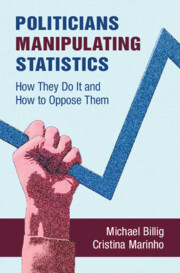
- Publisher:
- Cambridge University Press
- Online publication date:
- May 2025
- Print publication year:
- 2025
- Online ISBN:
- 9781009488143

Highly original and insightful, Billig and Marinho's book investigates how politicians misuse official statistics. Setting this problem in its historical context – and offering vivid case studies of Donald Trump, Boris Johnson and Gérald Darmanin – the authors demonstrate that the manipulation of statistics involves the misuse of words as well as the misuse of numbers. Most importantly, the authors show that politicians will manipulate official statisticians to produce politically convenient, but statistically inappropriate, numbers. Another unique part of the book is that the authors are not content with analysing how statistics are manipulated, but they also rigorously analyse the efforts of statistical agencies in France and Britain to combat such manipulation. The chapters herald unsung heroes who operate largely 'behind the scenes' to expose and oppose the corruption of statistics. An indispensable read for anyone concerned with the intersection of power and data.
‘This book transcends the conventional discussion about official statistics, courageously delving into the realm of political manipulation. This impressive and stimulating contribution to the understanding of statistical manipulation provides a remarkable historical contextualization, anchors this phenomenon in today’s anti-democratic practices and, through a diverse array of critical examples, describes various types and contexts of statistical manipulation. Its impact is poised to shape the discussion in this field for years to come.’
Jorge Vala - University of Lisbon
‘Why do people believe numbers instead of facts? This innovative book provides a range of answers via a detailed and comparative discourse analysis of salient case studies about the politics of numbers, the art of persuasion and manipulation, and the desire for simplicity. A masterpiece!’
Ruth Wodak - Lancaster University
‘… a subtle story of why those in charge massage numbers for their own benefit, and what can be done about it. As a statistician, I am beyond happy with the authors’ position on statistics. They rightly hold that statistics are much more than just numbers … It is, ultimately, a fascinating read, weaving together stories of individuals and systems around the globe. In this post-truth world, to understand how numbers are manipulated is a necessary - if not sufficient - step in nipping the consequences in the bud.’
Ole J. Forsberg - Professor of Mathematics and Chair of Statistics, Knox College, USA
 Loading metrics...
Loading metrics...
* Views captured on Cambridge Core between #date#. This data will be updated every 24 hours.
Usage data cannot currently be displayed.